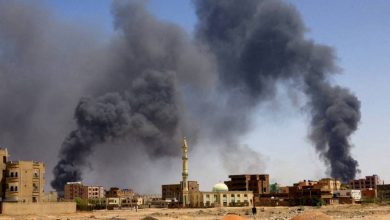Will U.S. Sanctions Against Al-Burhan Affect Sudan’s Economy?

Once again, the United States has wielded the stick of economic sanctions against Sudan, which had endured such measures for two decades, from 1997 to 2017. However, this time, the sanctions are different due to the ongoing war in Sudan between the Sudanese Armed Forces (SAF) and the Rapid Support Forces (RSF), a conflict nearing its second year.
Last Thursday, the U.S. Department of the Treasury announced sanctions on Sudan’s Sovereignty Council Chairman and Army Chief General Abdel Fattah Al-Burhan, accusing him of “choosing war over negotiations” to end the raging conflict in Sudan.
The Treasury’s statement detailed what it described as “war tactics pursued by the Sudanese military under Al-Burhan’s leadership,” including several violations outlined in the report.
This move followed sanctions imposed a week earlier on RSF leader Mohamed Hamdan Dagalo (Hemedti), with Washington accusing the RSF of committing genocide and targeting civilians.
In June, the United States sanctioned companies affiliated with the RSF. Additional sanctions followed in September against Abdul Rahim Hamdan Dagalo, the RSF’s deputy commander. In May, sanctions were imposed on RSF operations leader Osman Hamid.
Amid this series of sanctions, concerns have emerged that these measures might adversely impact Sudan’s already fragile economy, worsening the dire living conditions of Sudanese citizens who are grappling with deteriorating political and economic conditions.
Economic expert Dr. Mohammed Al-Nayer downplayed the potential economic impact of the sanctions imposed on Al-Burhan, stating that these measures are unlikely to have a significant effect on Sudan’s economy.
Al-Nayer explained that these sanctions are financial in nature and related to personal financial accounts, noting that Al-Burhan may not even have accounts in U.S. banks.
He further emphasized that the sanctions against the Sovereignty Council Chairman are unlikely to have the substantial effects portrayed in the media. He clarified that these sanctions are personal and do not target Sudan’s economy, exports, imports, or banking transactions.
Al-Nayer argued that these sanctions may aim to undermine Sudan’s sovereignty by targeting its leadership but will not have broader repercussions on the economy or external trade. He added that such measures could prompt Sudan to strengthen its alignment with Eastern blocs like BRICS, a move he has long advocated due to the West’s failure to fulfill its promises to Sudan.
Political analyst Dr. Mohamed Ali Torshein shared a similar view, asserting that the sanctions on Al-Burhan will have no direct impact on Sudan’s economy.
In an interview with Al-Muhaqiq, Torshein explained that the sanctions are limited to individuals and do not extend beyond them. He stated that the measures restrict sanctioned individuals from conducting financial transactions or accessing funds frozen in U.S. banks but do not affect Sudan’s economy or its people.
Torshein also noted that sanctions targeting RSF leaders and now military leadership will complicate the political landscape by diminishing these leaders’ chances of playing a future role in Sudanese politics.
Source: Al-Muhaqiq



